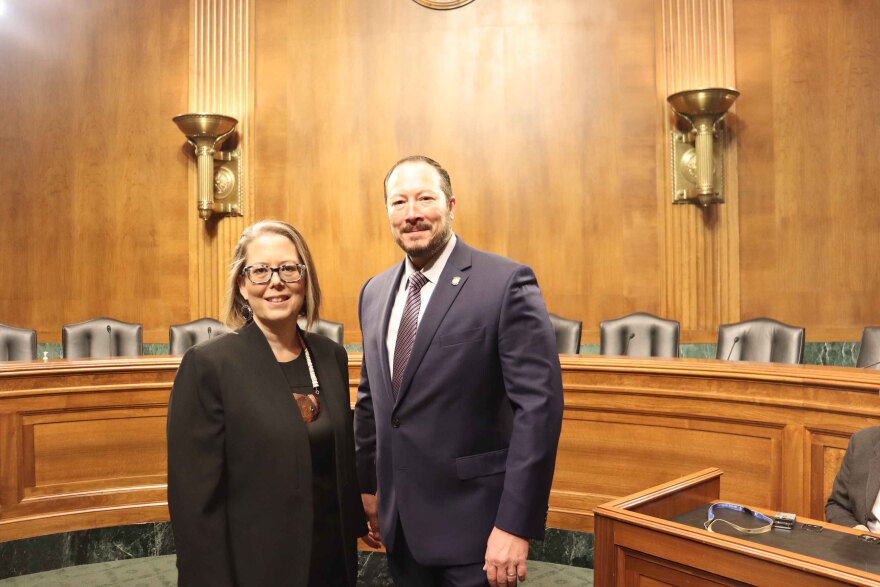Oklahoma’s Northern District Federal Court has a critical need for a new judge. Oklahoma Sen. James Lankford said the district has about 500 cases in their backlog in the wake of the McGirt decision and only one full time judge.
Tulsa attorney John David Russell is also a nominee for the federal bench in the district.
Hill had a career in private practice before she became attorney general for the Cherokee Nation. Hill also previously served as a special assistant United States attorney for the Northern District of Oklahoma.
During the hour-long hearing, Hill was grilled on her record, particularly when asked if she would enforce the 2022 Castro-Huerta decision, which narrowed the McGirt ruling. She has been critical of it historically.
"Certainly, on behalf of my client, I was critical of the decision in Castro-Huerta because it was a decision that had other ramifications in Indian law," Hill said when she was questioned by Utah Sen. Mike Lee.
Hill was also asked about her experience after the McGirt decision, which ruled that the Muscogee Nation's reservation was never disestablished. She said the tribal nation's dockets went from a couple of hundred cases a year to thousands of cases. Her office scaled up, she said, adding more prosecutors and staff.
Chairman Dick Durbin from Illinois asked Hill some questions about tribal sovereignty.
"Most members of Congress who have tribal representation in their states understand this whole issue of tribal sovereignty and the fact that you could have served as attorney general for the Cherokee Nation. Could you summarize in a few sentences the difference or the challenge that you faced with that responsibility?" Durbin asked.
Hill didn't shy away from talking about the challenges of scaling up after Cherokee Nation's caseload doubled almost overnight. She assured the committee that her position wasn't that of an advocate, as she was being the attorney general for the Cherokee Nation.
"Certainly, a district court judge for the United States is an entirely different job than the job of an advocate as attorney general. Of course, I was an advocate for the tribe's legal position and for its rights. Like all attorneys, I would advocate on behalf of my client with all the intellect and all of the strategic thought I could put into it on behalf of the nation for a federal district judge. That is an entirely different job. The job is to look at all the cases that come before you impartially and fairly, and looking at everything on their own terms and then applying the facts to the law. And it's a much different role entirely," Hill said.
Sen. Lindsey Graham of South Carolina asked Hill about a letter he received from the United Keetoowah Band of Cherokee, who, he said, questioned Hill's impartiality.
Over the years, the Cherokee Nation of Oklahoma and the UKB have litigated issues including putting land into trust for the purposes of gaming and a lawsuit over settlement money related to management of the Arkansas Riverbed.
Hill acknowledged there had been much litigation between the two, but said it wasn't her job to advocate for the Cherokee Nation if she were to become a judge for the Northern District.
"Certainly taking on the role of a federal district judge is one that leaves behind the life of advocacy and embraces the job, the job and the life of a jurist, one who takes the case before them and looks at them fairly, impartially and applies to a lot of the facts," Hill said.
Hill was also asked about Cherokee Federal, a division of Cherokee Nation Businesses, contracting with HHS and its Office of Refugee Resettlement to operate a temporary shelter in Pomona, California for unaccompanied children primarily coming from the Northern Triangle.
Hill said Cherokee Nation government officials had nothing to do with that contract.
"The Cherokee Nation would have had the interest of a shareholder in and in Cherokee Federal, which is a business arm that's operated by the nation. So it would have an interest in the company. Certainly it's the owner of that company, but that company is operated separately from the government. So it has its own attorneys and has its own infrastructure," she said.
Hill said she is excited about the possibility of getting the position.
"I think that having a such a large Native population in the state, I certainly feel like having a federal bench that reflects the community that serves it is a sign that your government is thriving, that the community is thriving, that things are working well," Hill said.
If confirmed, she would be the first Native American woman to serve as a federal judge in Oklahoma.








